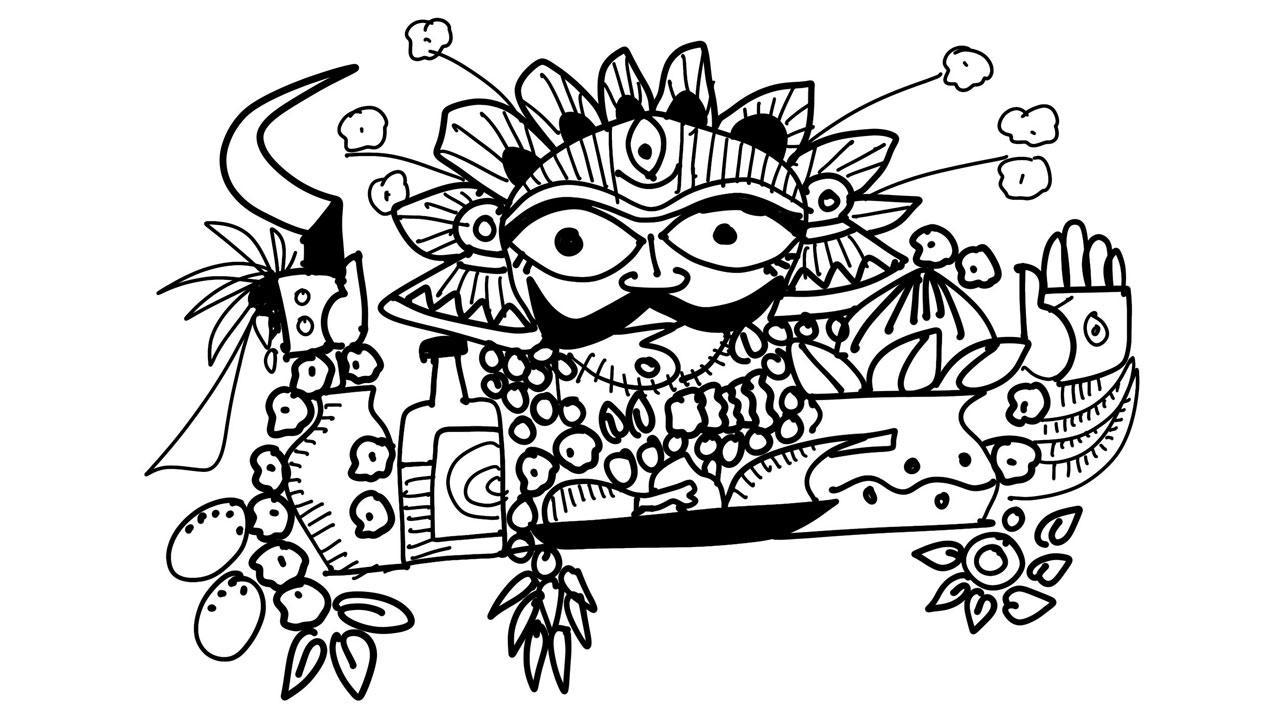Vedanta offered the solution. Humans have to be rescued from the ego that tempts us like the Devil. In temptation, we become hedonistic. In discipline, we become pure and pious

Illustration/Devdutt Pattanaik
 As per Christianity mythology, Jesus was crucified on Friday and he resurrected himself on Sunday. By defying death, he declares his status as Son of God. He is the saviour. Why do humans need a saviour? The answer is found in the Old Testament of the Bible. Humans are stricken by the sin of disobedience, after eating the fruit of the forbidden tree. By accepting Jesus as saviour, one is absolved of the crime.
As per Christianity mythology, Jesus was crucified on Friday and he resurrected himself on Sunday. By defying death, he declares his status as Son of God. He is the saviour. Why do humans need a saviour? The answer is found in the Old Testament of the Bible. Humans are stricken by the sin of disobedience, after eating the fruit of the forbidden tree. By accepting Jesus as saviour, one is absolved of the crime.
Under colonial rule, this idea of saviour became popular across India in the 19th century, and many people started interpreting Hinduism using the saviour theology. But Hinduism has no concept of disobedience or commandment of God. What will Hindus be saved from, wondered the new interpreters?
Vedanta offered the solution. Humans have to be rescued from the ego that tempts us like the Devil. In temptation, we become hedonistic. In discipline, we become pure and pious. Eden was equated with Krishna’s Gokul—full of music, cows and milkmaids. The Fall was equated with Mahabharata’s gambling hall, where senses lose control. More effectively, Eden was equated with purification, seeking a vegetarian “upper” caste lifestyle—shunning all things “polluting” like sex, alcohol, meat, much loved by India’s village, tribal and folk deities. Thus, caste was integrated into the saviour discourse.
In the 19th century, the word mythology was used for polytheism and theology was used for monotheism. To move from mythology to theology, Hindus, like Christians, could have only one saviour. Either Krishna, or Shiva, or Devi. Not all three. Folk deities like the gods who loved meat, alcohol, hook-swinging, fire-walking, were easy to shun. While in traditional Hindu models, there were different destinations for different castes, creeds, communities, the new monotheistic model insisted on one goal, one destination. So everyone had to eventually align with either Vaikuntha or Kailasa. This is what we see today in many gurudoms—where the “supreme” divine is either
Krishna or Shiva. And “supreme” is vegetarian and alcohol-free, unlike Bhairavas and Chamundas of yore.
If you ask Hindus in America and UK what Hinduism is, their answer will align with “upper” caste mythologies, based on purity and pollution, and goal orientation. Gita will be reduced to a set of advice on how “everyone” should live their life, mimicking Jesus’ sermon on the mount. Those who prefer Shiva over Krishna, will speak of Shiva as Dakshina-murti, the teacher who faces south, an image found only in South Indian temples. No one will refer to folk gods like Khandoba of Maharashtra, or Mahalsa of Goa, or Ram-dev-pir of Rajasthan, gods who have no “commandment” linked to them.
Tulu Nadu’s Bhuta-kola is acceptable in mainstream only when linked to Vishnu’s Varaha. Folk or desi parampara, with its frenzied dancing and loud hypnotic sounds, is seen as inferior to solemn Brahanical margi parampara. Folk and tribal rituals are not seen as mainstream Hinduism. They are of value only when Hindutva seeks votes in local elections.
The modern religious need for a “commandment” is why gurus thrive in the 21st century. In every sampradaya, the guru provides rules to live by. Markets today are flooded by “self-help” books marketed as “Vedic” by cosplaying monks who are single and celibate, like Jesus and his monks, and connected directly to the divine. By shunning women, meat and wine, and gods like Bhairava, Chamunda, or the more rural Krishna, or Bhuta, they assert their ‘upper’ caste pure status, now marketed with global Hindu identity shaped by Western/Christian/monotheistic benchmarks.
The author writes and lectures on the relevance of mythology in modern times. Reach him at devdutt.pattanaik@mid-day.com
 Subscribe today by clicking the link and stay updated with the latest news!" Click here!
Subscribe today by clicking the link and stay updated with the latest news!" Click here!








